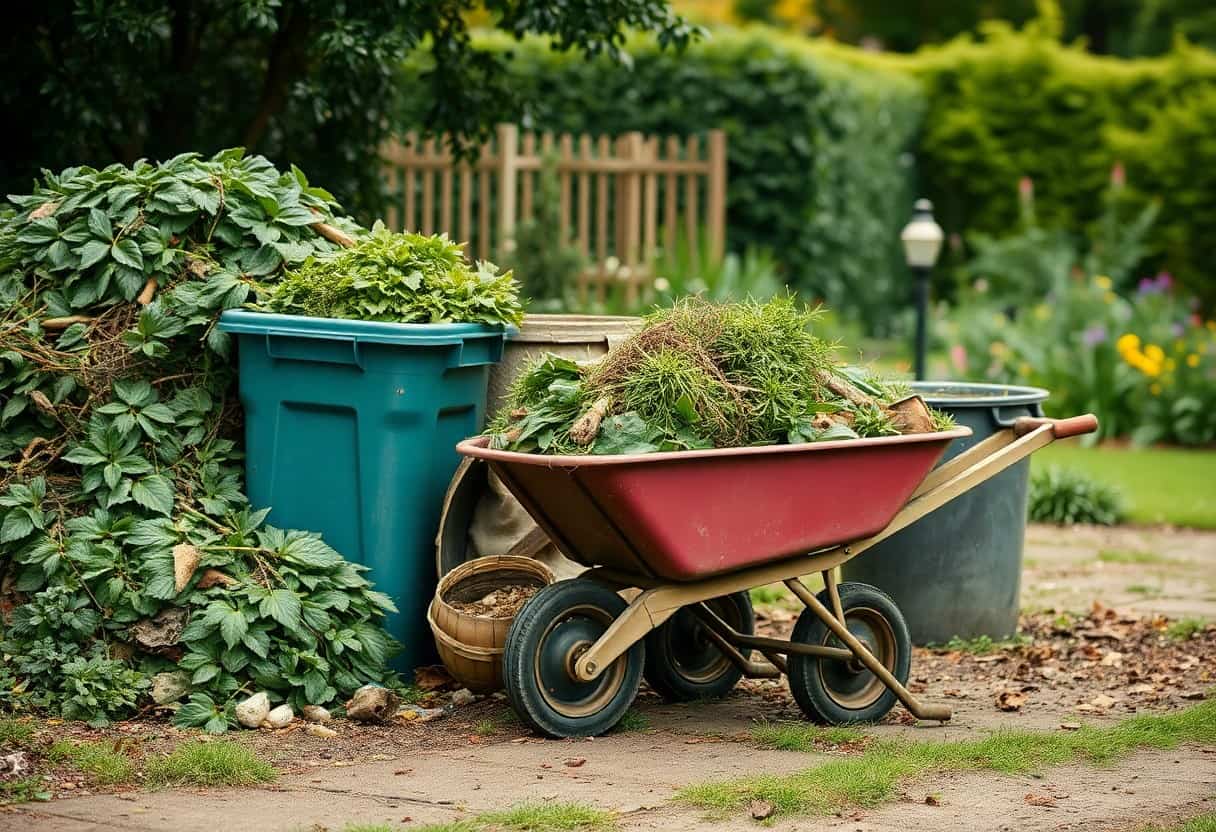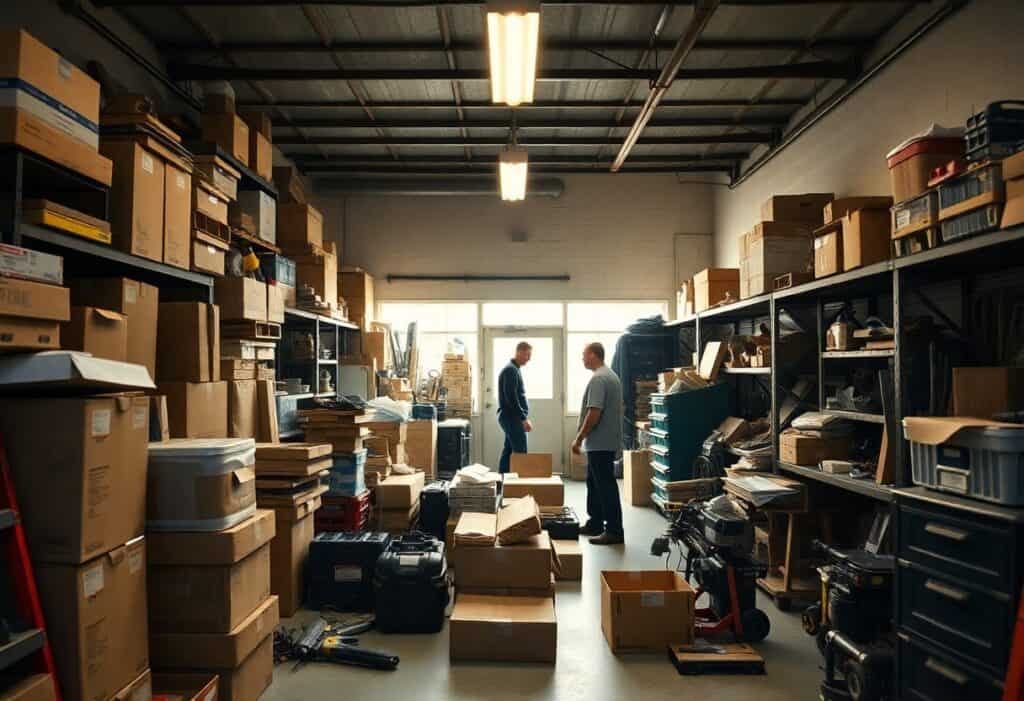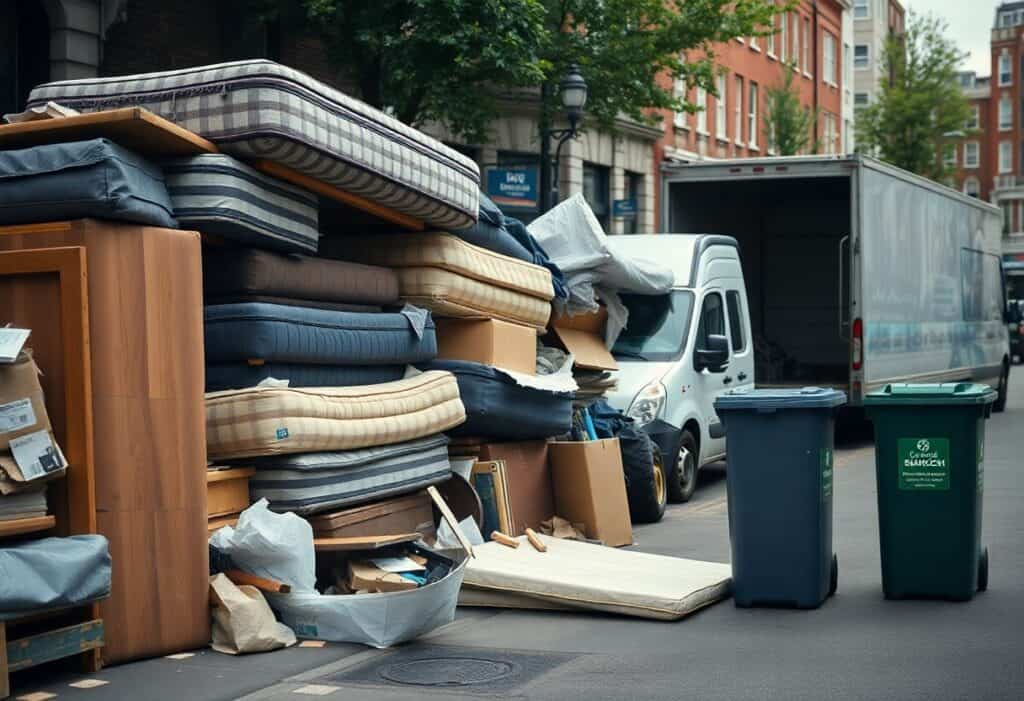Clearance of your garden can generate a significant amount of green waste, and knowing how to dispose of it correctly is imperative for maintaining your local environment. You can explore several eco-friendly options to ensure your waste is handled responsibly. This guide will provide you with effective methods for disposing of your garden debris, from using local council services to recycling or composting techniques, helping you create a cleaner, more organised outdoor space.
Understanding Green Waste
A comprehensive understanding of green waste is necessary for effective garden clearance in Surrey. Green waste refers to organic materials that are biodegradable and can be composted, recycling valuable nutrients back into the ecosystem.
Definition of Green Waste
The term green waste encompasses organic garden materials such as grass clippings, leaves, and small branches, which contribute to a cleaner environment when properly disposed of.
Common Types of Green Waste
Green waste can take various forms, including:
- Grass clippings
- Leaves
- Hedges
- Small branches
- Weeds
This variety highlights the importance of proper disposal methods to maximise benefits to your garden.
| Type of Green Waste | Details |
|---|---|
| Grass clippings | Can be composted or used as mulch. |
| Leaves | Make excellent compost over time. |
| Hedges | Should be trimmed regularly for healthy growth. |
| Small branches | Can be chipped into mulch or composted. |
| Weeds | Should be disposed of before they seed. |
For instance, grass clippings can accumulate quickly if you mow your lawn regularly. They serve not only as excellent mulch but also provide nutrients back to the soil when left in place. Leaves can often be collected and composted throughout autumn, while weeds need prompt attention to prevent them from spreading in your garden. Additionally, small branches can complicate your clearance if they are not disposed of correctly. Regular maintenance can significantly impact the ease of your clear-outs. This helps keep your garden tidy and supports a healthy ecosystem.
| Type of Green Waste | Benefits |
|---|---|
| Grass clippings | Rich in nitrogen, enhances soil health. |
| Leaves | Provide habitats for wildlife when composted. |
| Hedges | Support local biodiversity, acting as natural barriers. |
| Small branches | Useful for creating habitats and mulch. |
| Weeds | Remediation can prevent invasive species. |
Factors to Consider Before Disposal
It is vital to evaluate several factors before disposing of your green waste. Consider the following:
- Your local disposal options
- The types of waste generated
- The condition of the materials
- Potential costs involved
- Impact on your garden’s health
This ensures that you make informed decisions that benefit both your garden and the environment.
Local Regulations
Consider the local regulations in Surrey regarding green waste disposal. Many areas have specific guidelines on how to handle organic waste, including collection days and designated drop-off sites. Familiarising yourself with these rules will help you avoid potential fines and ensure that your garden clearance complies with local standards.
Environmental Impact
You must also reflect on the potential environmental impact of your disposal methods. Choosing sustainable practices not only contributes to a healthier ecosystem but also can enhance the overall biodiversity of your garden.
Factors such as improper disposal can lead to soil contamination and harmful emissions. On the other hand, composting your green waste can significantly benefit the environment by enriching your soil and reducing landfill waste. Additionally, using community recycling schemes can foster a sense of local responsibility and promote environmental stewardship. Making the right choices can help you positively impact the environment while maintaining a thriving garden.
How to Prepare Green Waste for Disposal
Some preparation is necessary for effectively disposing of your green waste. Start by gathering all organic materials, including grass clippings, leaves, and branches. Ensure that your waste is free from non-biodegradable items, as this can lead to contamination and problems in the disposal process. By taking the time to prepare your green waste correctly, you can make disposal much more efficient.
Sorting and Separating
The key to successful green waste disposal is sorting and separating different types of materials. Group items like soft green waste, such as grass and leaves, separately from woody materials like branches and twigs. This organisation will help ensure more efficient composting or chipping processes, as each type of green waste requires different methods of disposal.
Proper Packing Techniques
You can enhance your green waste disposal experience by employing proper packing techniques. Make sure to compact your waste carefully in bags or bins, ensuring they are neither too heavy nor too large to handle. This will not only make transportation easier but also assist in keeping the waste tidy and manageable.
Green waste should be packed securely to prevent any spillage and maintain a neat appearance. Use sturdy bags or bins that can support the weight of your materials without tearing. For heavy or bulky items, consider loading them into a trailer or a skip if available. Ensure that all materials are well-contained so they don’t scatter during transport. Taking care of these packing details will enable you to dispose of your green waste without hassle, while also making the process safer.
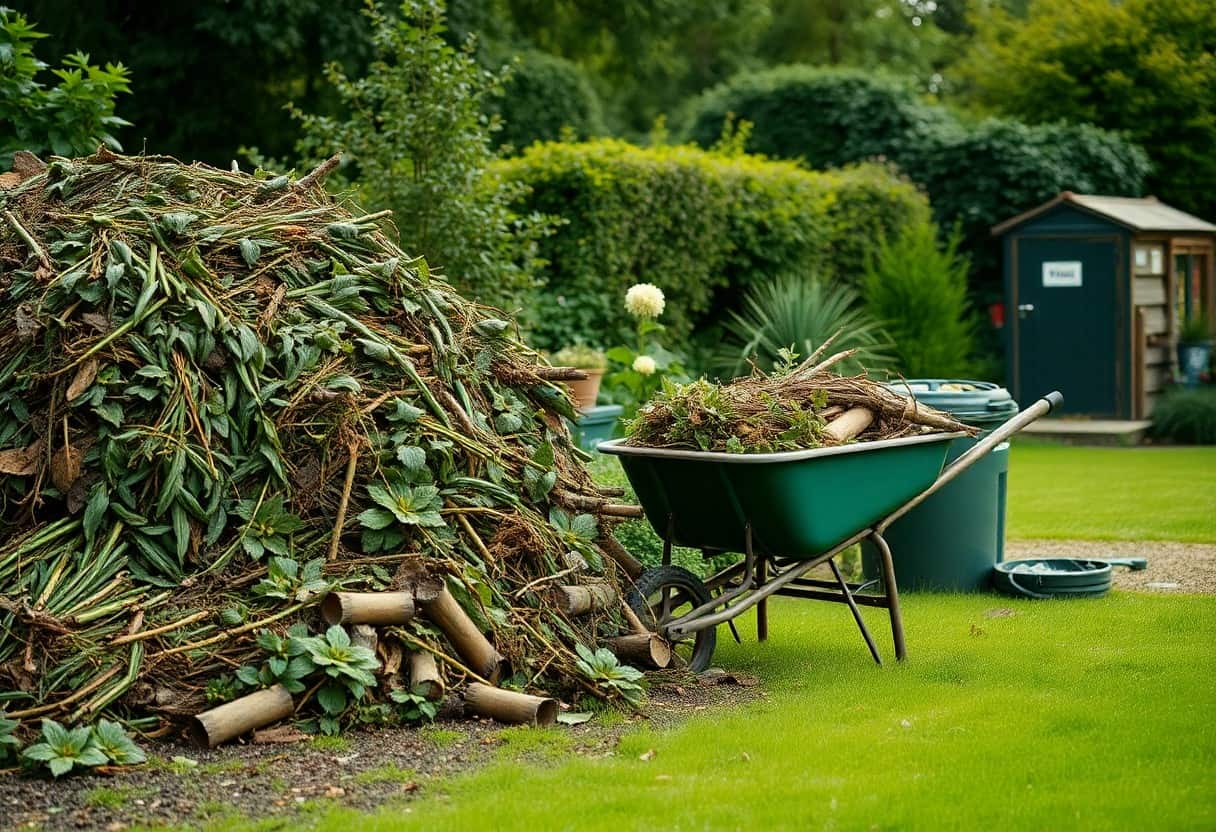
Tips for Effective Disposal Methods
Now, to ensure you manage your green waste efficiently, consider these tips:
- Evaluate waste for composting potential.
- Utilise local recycling facilities.
- Engage in municipal green waste collection.
For more information, check out Professional Gardening in Surrey: Green Waste Disposal …. Recognising the best methods can simplify your garden clearance.
Composting Options
Effective composting can transform your green waste into valuable garden resources. You can create a compost pile in your garden, or use a compost bin to keep it contained. Ensure you balance green materials with brown materials like dried leaves for optimal decomposition. This reduces waste while enhancing your soil quality.
Recycling Facilities
Now, using recycling facilities is an excellent way to handle your green waste. Contact your local council for information on nearby centres where you can drop off unwanted garden debris.
This is an efficient route to reduce landfill contributions while supporting the environment. Many facilities accept a variety of garden waste, including grass clippings, branches, and leaves. Recycling your green waste not only assists sustainability efforts but may also yield recycled products like compost or mulch.
Municipal Green Waste Collection
Tips for taking advantage of municipal green waste collection include checking your local council’s schedule for collection dates and preparing your waste accordingly. Familiarise yourself with accepted materials to ensure compliance.
Another key aspect is to place your waste out for collection the night before. This will ensure it’s collected promptly. Utilising these municipal services helps you manage your garden waste responsibly, making it easier for you to maintain your garden and contribute positively to your community.
Alternatives to Traditional Disposal
Unlike traditional disposal methods, which often involve sending your green waste to landfill, there are several eco-friendly alternatives to consider. Exploring composting, mulching, and community sharing programmes not only benefits the environment but can also enhance your garden’s health. Adopting these methods allows you to repurpose your green waste effectively, minimising your ecological footprint and contributing positively to your local community.
Mulching
Clearly, mulching is an excellent option for disposing of green waste. By shredding your garden clippings and leaves, you create a natural barrier that controls weeds, retains moisture, and enriches the soil as it decomposes. Using your green waste as mulch enhances the overall health of your garden ecosystem while reducing the amount of waste you produce.
Community Sharing Programs
Clearly, community sharing programmes provide an innovative way to handle green waste. These initiatives encourage gardeners to share surplus garden materials, such as leaf mould or wood chips, with neighbours or local gardening clubs. By participating, you not only reduce waste but also foster connections within your community.
Traditional methods often lead to excessive waste generation and missed opportunities for sustainability. Community sharing programmes can be a fantastic avenue for enhancing soil fertility and promoting a sense of community. Many local councils or gardening groups organise events where residents can exchange plant cuttings, seeds, or compost. Engaging in these programmes creates a shared sense of responsibility for the local environment while helping you find a new home for your green waste. This initiative not only reduces the amount of waste sent to landfills but also encourages sustainable gardening practices and strengthens community bonds.
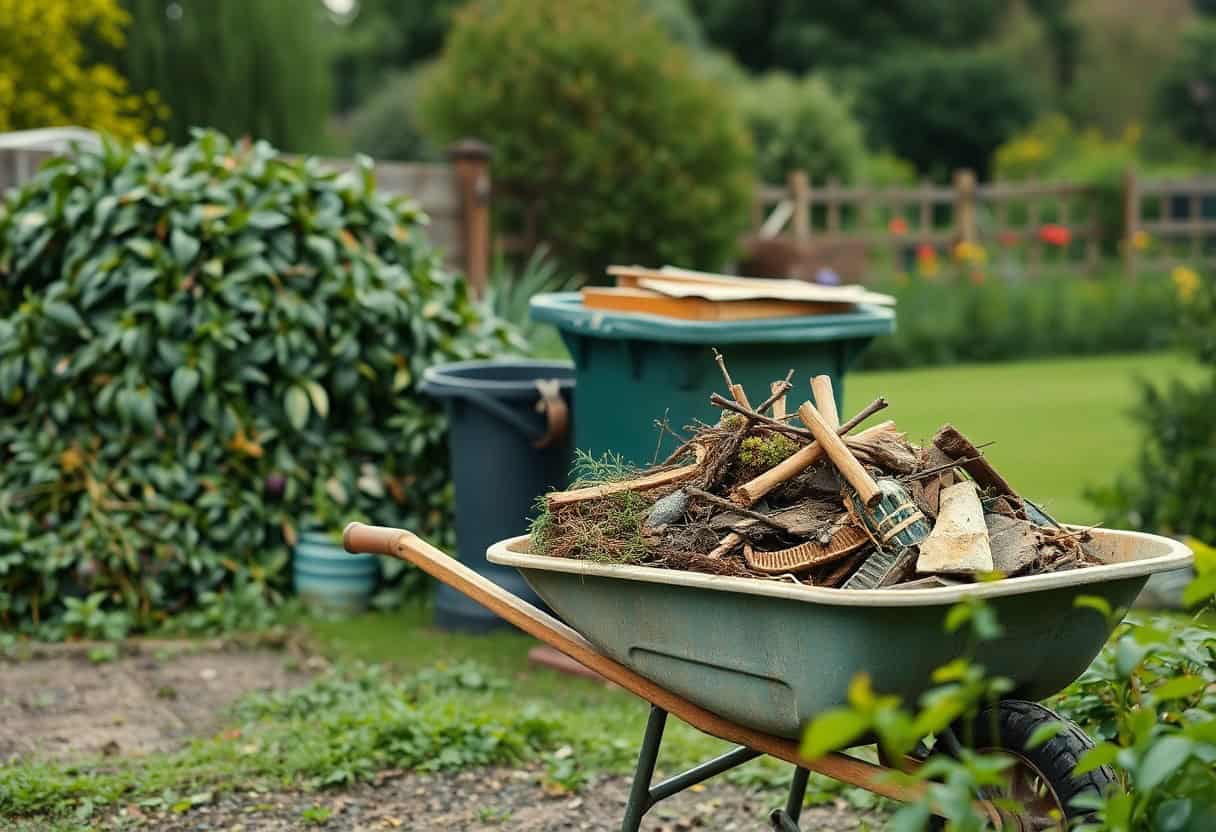
Preventing Future Waste
Your efforts in managing garden waste can greatly benefit from Garden Waste Clearance – Swift and Eco-Friendly. By incorporating regular pruning, composting, and mulching into your gardening routine, you can significantly reduce the amount of green waste produced. Investing time in prevention will help maintain a tidier garden while promoting sustainability, so you can enjoy your outdoor space without the hassle of excessive waste management.
Sustainable Gardening Practices
An effective way to minimise waste is to adopt sustainable gardening practices that foster a healthier ecosystem. This includes using organic methods for pest control and choosing native plants that require less water and maintenance. By embracing these practices, you contribute positively to the environment while enhancing the aesthetic appeal and vitality of your garden.
Planning Your Garden Layout
Practices such as thoughtful planning of your garden layout can significantly reduce future green waste. Assess the space available and select plants wisely based on your garden’s specific conditions, including sunlight and soil type. By clustering plants with similar needs, you can create a thriving garden that requires less upkeep. Furthermore, placing larger plants towards the back ensures streamlined growth and simplifies maintenance, ultimately reducing the amount of green waste generated over time.
To maximise the impact of your garden layout, you ought to consider the growth patterns and mature sizes of your chosen plants. Doing so will allow you to better forecast the amount of maintenance required and enable a more efficient approach to cutting back or reshaping plants as needed. Additionally, incorporating perennials instead of annuals can not only minimise waste but also create a more stable and resilient garden ecosystem. Ultimately, a well-planned garden layout supports sustainability while enhancing your overall gardening experience.
Final Words
Conclusively, disposing of green waste during your Surrey garden clearance can be efficiently managed by utilising local council services, licensed waste carriers, or composting at home. Ensure you follow local regulations regarding the collection of garden waste, and always seek to recycle where possible. By choosing the right method, you not only maintain a tidy garden but also contribute positively to the environment.
FAQ
Q: What is considered green waste in Surrey?
A: Green waste includes organic materials such as grass cuttings, leaves, branches, hedge trimmings, flowers, and other plant materials resulting from garden maintenance. It is important to separate green waste from general waste to facilitate proper disposal and recycling.
Q: How can I dispose of green waste during my garden clearance in Surrey?
A: There are several methods for disposing of green waste during a garden clearance in Surrey. You can use your local council’s green waste collection service if available, take it to a designated recycling centre, or compost it at home. Ensure you check with your local authority for specific guidelines and options.
Q: Are there any fees associated with green waste disposal in Surrey?
A: Some local councils in Surrey may charge a fee for green waste collection services. It is advisable to visit your local council’s website or contact them directly to get detailed information regarding any applicable charges and the services offered.
Q: Can I compost green waste at home, and if so, how?
A: Yes, you can compost green waste at home. To compost effectively, create a compost heap or use a compost bin. Mix green waste with brown materials (like dried leaves, cardboard, and paper) to balance nitrogen and carbon levels. Regularly turn the compost and ensure it remains moist for the best results.
Q: What should I do with large branches or tree cuttings during garden clearance?
A: For large branches or tree cuttings, you have a few options. You can chip them into smaller pieces using a garden shredder, dispose of them through your local council’s garden waste service if allowed, or take them to a recycling centre. Some companies also offer collection services for larger garden waste items.

